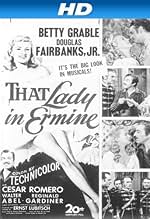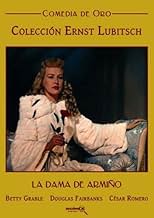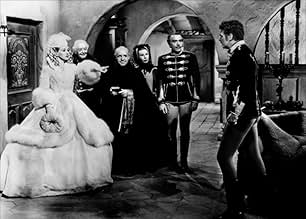NOTE IMDb
5,8/10
972
MA NOTE
Ajouter une intrigue dans votre langueThat Lady in Ermine tells two parallel stories, both taking place in the small Mittel-European duchy of Bergamo, with one set in the 19th century and the other in the 16th.That Lady in Ermine tells two parallel stories, both taking place in the small Mittel-European duchy of Bergamo, with one set in the 19th century and the other in the 16th.That Lady in Ermine tells two parallel stories, both taking place in the small Mittel-European duchy of Bergamo, with one set in the 19th century and the other in the 16th.
- Réalisation
- Scénario
- Casting principal
- Nommé pour 1 Oscar
- 2 nominations au total
Lester Allen
- Jester
- (non crédité)
Mary Bear
- Isabella - Ancestor
- (non crédité)
David Bond
- Gabor
- (non crédité)
Harry Carter
- Staff Officer
- (non crédité)
Harry Cording
- Orlando - Ancestor
- (non crédité)
Herbert Evans
- Ancestor
- (non crédité)
Jack George
- Count Giovanni - Ancestor
- (non crédité)
Don Haggerty
- Staff Officer
- (non crédité)
Joe Haworth
- Soldier
- (non crédité)
Ray Hyke
- Albert's Knight
- (non crédité)
Avis à la une
I just watched this film on YouTube; it's there for free in version with very good image quality. It was a box office flop, and has a poor reputation among classic film devotees. But if you enjoy musicals, you might want to give it a chance.
I mildly enjoyed it. Fairbanks Jr. Is excellent, giving a spirtited performance with the right touch of believable emotion and light tungue in cheek playfulness. The sets are opulant. Fredrick Holander's music is lovely, though the song lyrics (by Leo Robin?) are mediocre and banal. There are occasional playfully funny moments.
On the down side, the film overall lacks the charm, subtle sexiness, and light touch that Lubitch would have given it, if he had directed the entire thing, and his capabilities were not greatly diminished by very poor health. Grable is OK in the role, but far from the ideal actress-singer for it. I've read that Fox head Zanick wanted to broaden her appeal and put her in more high class roles, so she made three classy pictures and all of them, including this one flopped. (One of them is excellent, and I highly recommend it, "The Shocking Miss Pilgrim".)
That Lady in Ermine seems to have two endings; and I felt let down by the second one. It should have ended when the Fairbanks character rides away, bidding the Grable character a regretful goodby. But then there's a entirely unnecessary scene, which seems tacked on.
I mildly enjoyed it. Fairbanks Jr. Is excellent, giving a spirtited performance with the right touch of believable emotion and light tungue in cheek playfulness. The sets are opulant. Fredrick Holander's music is lovely, though the song lyrics (by Leo Robin?) are mediocre and banal. There are occasional playfully funny moments.
On the down side, the film overall lacks the charm, subtle sexiness, and light touch that Lubitch would have given it, if he had directed the entire thing, and his capabilities were not greatly diminished by very poor health. Grable is OK in the role, but far from the ideal actress-singer for it. I've read that Fox head Zanick wanted to broaden her appeal and put her in more high class roles, so she made three classy pictures and all of them, including this one flopped. (One of them is excellent, and I highly recommend it, "The Shocking Miss Pilgrim".)
That Lady in Ermine seems to have two endings; and I felt let down by the second one. It should have ended when the Fairbanks character rides away, bidding the Grable character a regretful goodby. But then there's a entirely unnecessary scene, which seems tacked on.
Watching That Lady In Ermine I was wondering what Betty Grable was doing in a project that seemed to be aimed for Marlene Dietrich to do. Someone over at 20th Century Fox may have decided one sex symbol is as good as another. Darryl F. Zanuck should have known better.
Betty plays a 19th century Italian countess whose domain has been invaded by a troop of Hungarian Hussars captained by Douglas Fairbanks, Jr. Her ghostly ancestor whose portrait hangs in the palace hall along with the rest of her distinguished family tree, sees no small resemblance in Doug now and another invader some 300 years earlier whom she dealt with when armies failed.
Besides that the current Betty has just been married to Cesar Romero and the invasion has come at a most inopportune moment, before things have been consummated. That's going to give anyone a bad attitude, I guarantee.
Fresh, wholesome all American Betty is NOT the actress to do seductive and mysterious. Marlene Dietrich might have put this over, but with Betty it falls flatter than yesterday's presidential candidate. She and Fairbanks have no chemistry at all, though Doug is as charming as ever and someone I can watch in anything.
Frederick Hollander and Leo Robin wrote the score for this film and This Is The Moment got an Oscar nomination for Best Song. That Lady In Ermine's one chance for Oscar glory fell to Buttons And Bows.
Ernest Lubitsch died midway during the film and Otto Preminger finished That Lady In Ermine. I can't believe Lubitsch had Grable in mind for the lead here. Neither will you if you see That Lady In Ermine.
Betty plays a 19th century Italian countess whose domain has been invaded by a troop of Hungarian Hussars captained by Douglas Fairbanks, Jr. Her ghostly ancestor whose portrait hangs in the palace hall along with the rest of her distinguished family tree, sees no small resemblance in Doug now and another invader some 300 years earlier whom she dealt with when armies failed.
Besides that the current Betty has just been married to Cesar Romero and the invasion has come at a most inopportune moment, before things have been consummated. That's going to give anyone a bad attitude, I guarantee.
Fresh, wholesome all American Betty is NOT the actress to do seductive and mysterious. Marlene Dietrich might have put this over, but with Betty it falls flatter than yesterday's presidential candidate. She and Fairbanks have no chemistry at all, though Doug is as charming as ever and someone I can watch in anything.
Frederick Hollander and Leo Robin wrote the score for this film and This Is The Moment got an Oscar nomination for Best Song. That Lady In Ermine's one chance for Oscar glory fell to Buttons And Bows.
Ernest Lubitsch died midway during the film and Otto Preminger finished That Lady In Ermine. I can't believe Lubitsch had Grable in mind for the lead here. Neither will you if you see That Lady In Ermine.
I enjoyed this film far more than anything had led me to anticipate; from reading other comments here, I suspect it benefits enormously from being seen on a full-size screen in the cinema, in the company of a cheerful and enthusiastic audience. I was lucky enough to have that experience, borne up on ripples of laughter from all around, and had an immensely good time with this undemanding comedy.
For it is as a comedy that it shines, if it shines anywhere at all. The music is nothing special -- in fact, I hadn't realised it *was* a musical, and was very surprised when the assembled ancestors burst into half-spoken lyric -- but I do have to admit that the half-threat, half-promise of 'Oh, what I'll do...' has proved far more catchy than it ever seemed at the time, as it's still going round and round in my head!
The plot, such as it is, largely pivots around the past history of the eponymous Francesca, a sixteenth-century portrait sporting a distinctly anachronistic hairstyle and fur-coat. Her idea on the sanctity of marriage don't quite jibe with those of her distant descendant, the Countess Angelina, and one can almost hear the storyline creaking at the seams under the strain of the Production Code in order to ensure that the heroine arrives unsullied in her much-delayed marriage-bed with the right man...
The romance is scarcely earth-shattering, and in fact the first few scenes, played pretty well straight, verge on the tedious. But where script and film really come to life is in the battle of the sexes that follows. The impudence of Douglas Fairbanks Jr's courtship of Betty Grable's married Angelina is equalled only by Betty-Grable-as-Francesca's pursuit of him in turn, culminating in complete role-reversal in the hilarious fantasy sequence where she -- literally -- sweeps him off his feet. This is probably the comic climax of the plot, although the consequences of the Colonel's understandable confusion are worked out with a deft touch in the remaining two 'acts' of the operetta-structure, and the spectacle of Fairbanks' blissful, bemused awakening is more or less worth the price of admission on its own.
Grable is entirely convincing in establishing her two contrasting characters, wisely gets almost all the (limited) singing opportunities, and shares the honours where the swathes of quotable dialogue in the various verbal duels are concerned. But in the field of unspoken reaction she is really outclassed by her male supporting leads; Fairbanks in particular is an absolute treat in a number of wordless sequences whose set-up and humour is worthy of the silent screen.
This film is too uneven in style to be a classic, varying from sparkling repartee to hackneyed tedium. But at its best it is quite honestly very funny indeed, and brought a round of spontaneous applause and laughter across the auditorium at the end as the lights went up. Out of tune with its times, it may have failed to draw contemporary audiences -- but, on this showing, really didn't deserve to be disowned by both Grable and Preminger, the (uncredited) director. This is no masterpiece, but a thoroughly entertaining minor work, and I for one found myself grinning in remembrance all the way home.
For it is as a comedy that it shines, if it shines anywhere at all. The music is nothing special -- in fact, I hadn't realised it *was* a musical, and was very surprised when the assembled ancestors burst into half-spoken lyric -- but I do have to admit that the half-threat, half-promise of 'Oh, what I'll do...' has proved far more catchy than it ever seemed at the time, as it's still going round and round in my head!
The plot, such as it is, largely pivots around the past history of the eponymous Francesca, a sixteenth-century portrait sporting a distinctly anachronistic hairstyle and fur-coat. Her idea on the sanctity of marriage don't quite jibe with those of her distant descendant, the Countess Angelina, and one can almost hear the storyline creaking at the seams under the strain of the Production Code in order to ensure that the heroine arrives unsullied in her much-delayed marriage-bed with the right man...
The romance is scarcely earth-shattering, and in fact the first few scenes, played pretty well straight, verge on the tedious. But where script and film really come to life is in the battle of the sexes that follows. The impudence of Douglas Fairbanks Jr's courtship of Betty Grable's married Angelina is equalled only by Betty-Grable-as-Francesca's pursuit of him in turn, culminating in complete role-reversal in the hilarious fantasy sequence where she -- literally -- sweeps him off his feet. This is probably the comic climax of the plot, although the consequences of the Colonel's understandable confusion are worked out with a deft touch in the remaining two 'acts' of the operetta-structure, and the spectacle of Fairbanks' blissful, bemused awakening is more or less worth the price of admission on its own.
Grable is entirely convincing in establishing her two contrasting characters, wisely gets almost all the (limited) singing opportunities, and shares the honours where the swathes of quotable dialogue in the various verbal duels are concerned. But in the field of unspoken reaction she is really outclassed by her male supporting leads; Fairbanks in particular is an absolute treat in a number of wordless sequences whose set-up and humour is worthy of the silent screen.
This film is too uneven in style to be a classic, varying from sparkling repartee to hackneyed tedium. But at its best it is quite honestly very funny indeed, and brought a round of spontaneous applause and laughter across the auditorium at the end as the lights went up. Out of tune with its times, it may have failed to draw contemporary audiences -- but, on this showing, really didn't deserve to be disowned by both Grable and Preminger, the (uncredited) director. This is no masterpiece, but a thoroughly entertaining minor work, and I for one found myself grinning in remembrance all the way home.
I really enjoyed this Lubitsch movie with Betty Grable. It made quite a change from her usual "musicals", and I cannot again understand why there have been no videos or DVDs made of it. Younger viewers who don't even know who Betty Grable is will surely appreciate this Lubitsch movie. Here's hoping!
Ernst Lubitsch's style permeates this unjustly forgotten movie, from a different age of cinema. Oddly enough, any old film noir (or just crime-oriented) feature from its age is revered on a pedestal today, while this wonderful 20th Century-Fox big-budget effort stirs little interest.
It is a remake of a 1927 silent film of the same title, a Corinne Griffith star vehicle from First National Pictures, the distributor that later became part of Warner Brothers. It's a lost film, perhaps because a silent movie of an operetta was hopelessly dated even then. Lubitsch includes fantasy and satire here, with the play-acting performances of stars Grable and Fairbanks delightful in that they make fun of the antiquated Period Costume Film cliches, while simultaneously creating warm and empathetic characters. The elements of satire have given way in modern cinema to vulgarity, as evidenced in the work of Mel Brooks (who remade Lubtisch's hit "To Be Or Not to Be") or my favorite director Ken Russell, yet Lubitsch is able to maintain the high ground even in the silliest of scenes, perhaps aided by the censorship of his day.
The Technicolor photography (by Leon Shamroy) remains stunning and just what any film buff should admire. A couple of oddities struck me as I finally saw this movie, so many decades after release, first the foot-fetish theme that instantly suggests Luis Bunuel, who was working in Hollywood during this period. And by some odd coincidence, the starting point for the movie's fantasy element is the stunning portrait of Gable as a 17th Century ancestor of her main character, which comes to life occasionally. Fairbanks' infatuation with the lady in the portrait is the same starting point as Preminger's greatest movie, "Laura", and Otto ended up completing "Ermine" after Lubitsch's sudden death at the age of 55.
It is a remake of a 1927 silent film of the same title, a Corinne Griffith star vehicle from First National Pictures, the distributor that later became part of Warner Brothers. It's a lost film, perhaps because a silent movie of an operetta was hopelessly dated even then. Lubitsch includes fantasy and satire here, with the play-acting performances of stars Grable and Fairbanks delightful in that they make fun of the antiquated Period Costume Film cliches, while simultaneously creating warm and empathetic characters. The elements of satire have given way in modern cinema to vulgarity, as evidenced in the work of Mel Brooks (who remade Lubtisch's hit "To Be Or Not to Be") or my favorite director Ken Russell, yet Lubitsch is able to maintain the high ground even in the silliest of scenes, perhaps aided by the censorship of his day.
The Technicolor photography (by Leon Shamroy) remains stunning and just what any film buff should admire. A couple of oddities struck me as I finally saw this movie, so many decades after release, first the foot-fetish theme that instantly suggests Luis Bunuel, who was working in Hollywood during this period. And by some odd coincidence, the starting point for the movie's fantasy element is the stunning portrait of Gable as a 17th Century ancestor of her main character, which comes to life occasionally. Fairbanks' infatuation with the lady in the portrait is the same starting point as Preminger's greatest movie, "Laura", and Otto ended up completing "Ermine" after Lubitsch's sudden death at the age of 55.
Le saviez-vous
- AnecdotesIn later years Betty Grable said it was her least favorite of all her movies.
- GaffesIf you watch when the Lady in Ermine is dancing with Colonel Ladislas Karolyi Teglas / The Duke her shoes change from the heels to wedges.
- Citations
Col. Ladislas Karolyi Teglas: If one is in love, one doesn't need an umbrella.
- ConnexionsFeatured in The Costume Designer (1950)
- Bandes originalesOoh! What I'll Do (To That Wild Hungarian)
(uncredited)
Written by Friedrich Hollaender
Lyrics Leo Robin
Sung by Betty Grable and chorus
Danced by Betty Grable and Douglas Fairbanks Jr.
Meilleurs choix
Connectez-vous pour évaluer et suivre la liste de favoris afin de recevoir des recommandations personnalisées
- How long is That Lady in Ermine?Alimenté par Alexa
Détails
Box-office
- Budget
- 2 484 000 $US (estimé)
- Durée
- 1h 29min(89 min)
- Couleur
- Rapport de forme
- 1.37 : 1
Contribuer à cette page
Suggérer une modification ou ajouter du contenu manquant





































